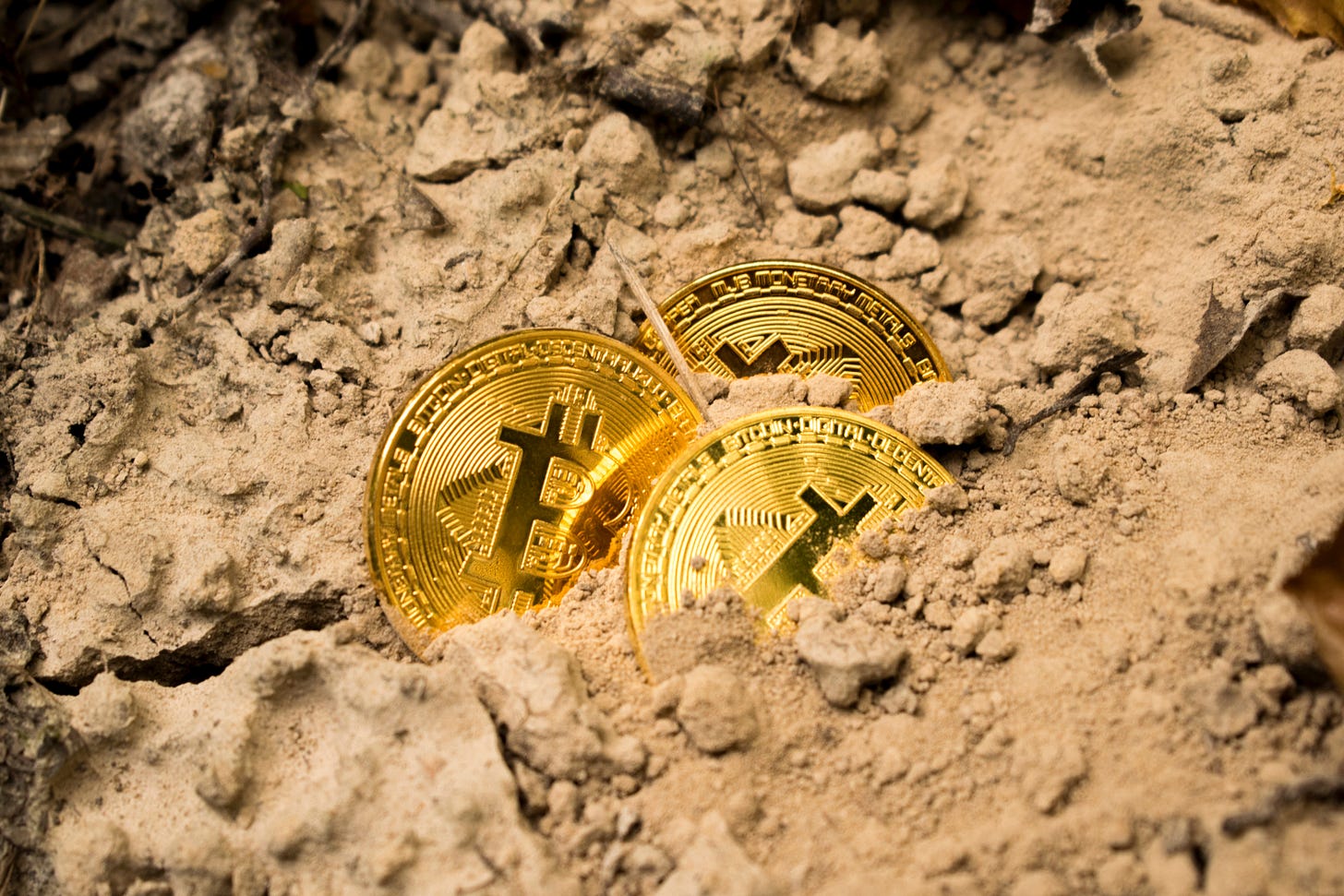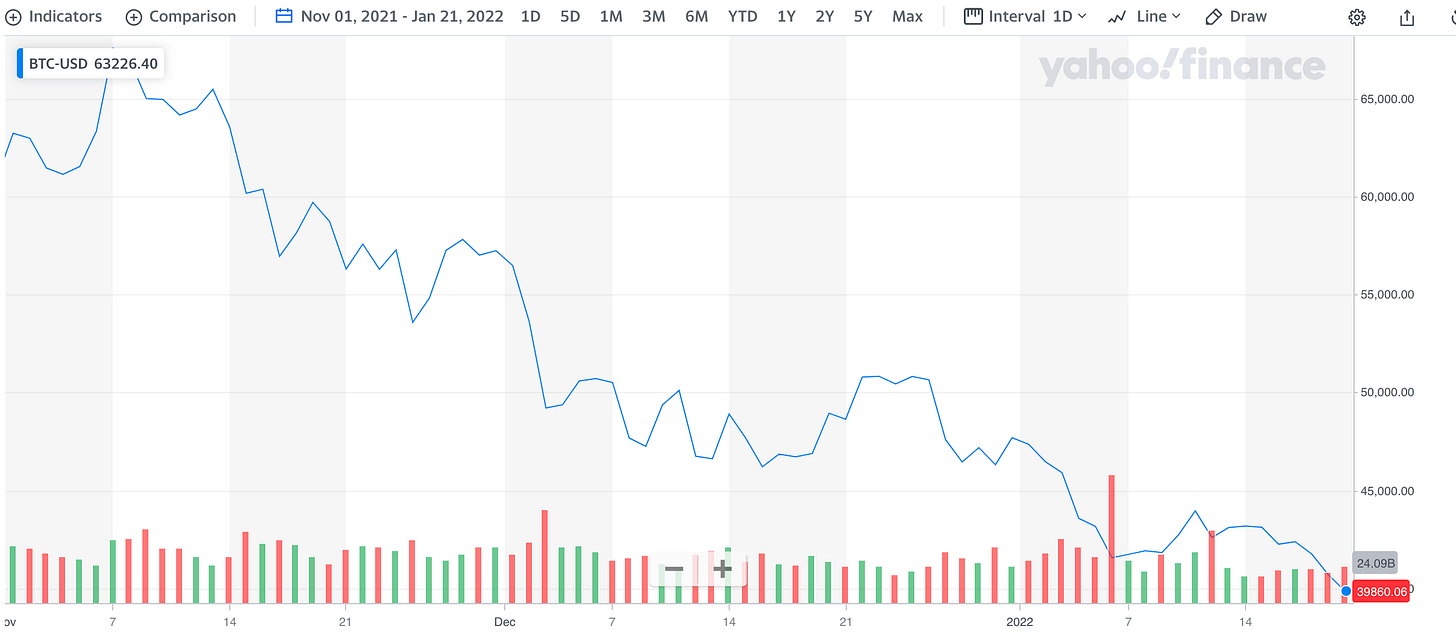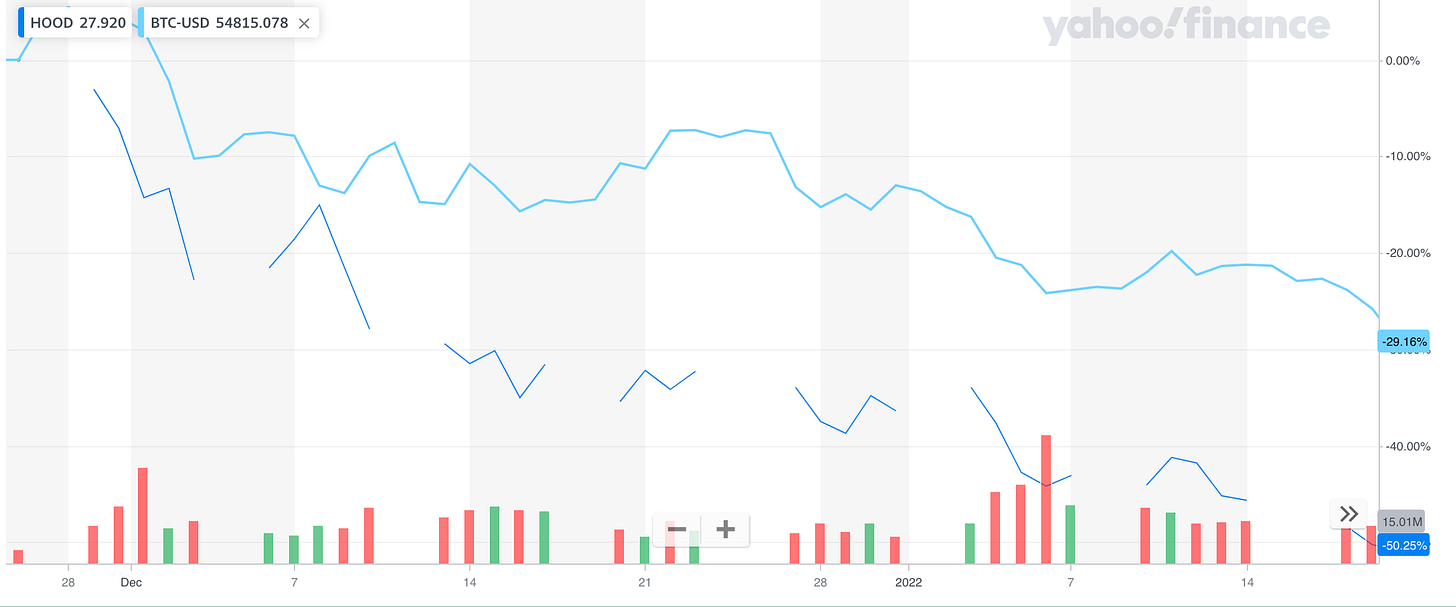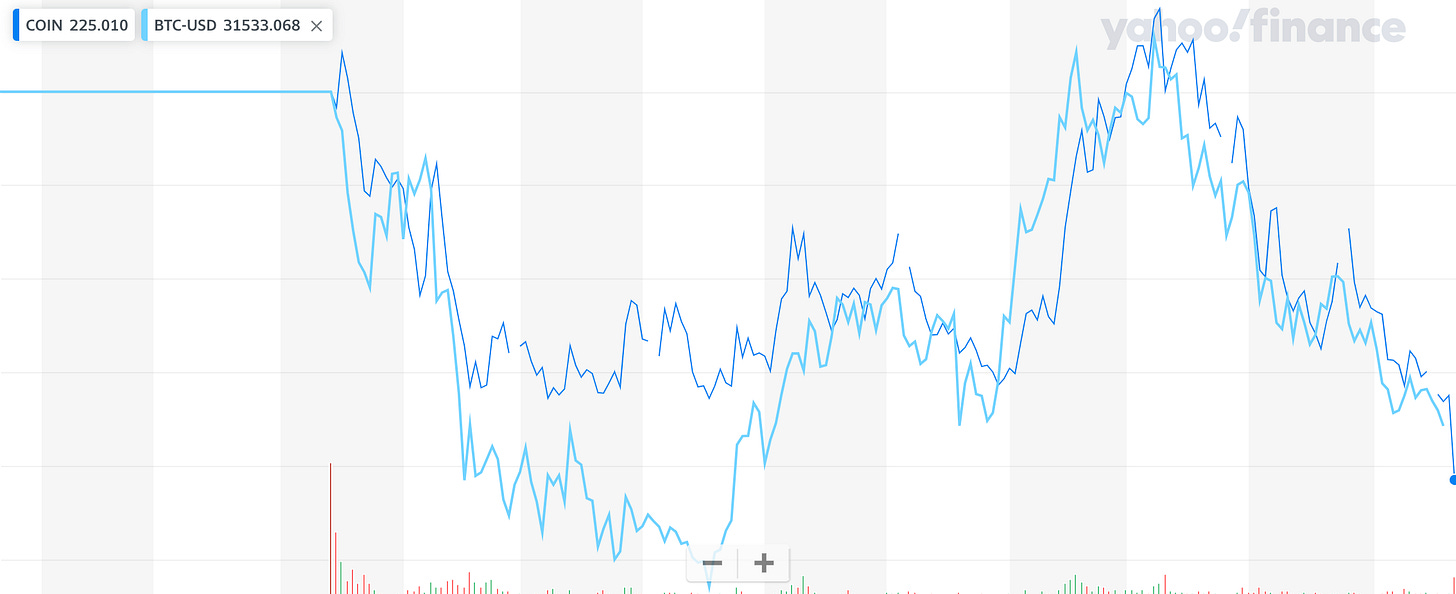
Number of the Week: $17.5 million (explanation below)
The Bitcoin Recession
This week the Nasdaq stock exchange officially entered correction territory, with other US indices not far behind. The reasons offered for this dip include: bond yields are up, creating a tempting alternative to stocks; Nasdaq’s big tech stocks are under tremendous regulatory pressure; and the Federal Reserve is tightening monetary policy.
But the Nasdaq nosedive doesn’t begin to compare to the hellward trajectory of Bitcoin since mid-November. As this gravity-driven chart shows, Bitcoin has tossed nearly half of its value against the US dollar in only two months:
Bitcoin’s price has dropped dramatically before, notably during the Bitcoin winter of 2017. But in those days, Bitcoin and cryptocurrency were worth a fraction of their present market capitalizations, and were largely isolated from the “real world” economy. Today, for better or worse, cryptocurrency is ostensibly worth trillions of dollars, and is intimately entwined with several large publicly traded companies, the government of El Salvador, holdings in family offices and investment firms, hundreds of millions of individual owners worldwide, etc. There is an entire crypto ecosystem that, at the moment, is in full-blown recession.
There are so many examples, but Robinhood comes quickly to mind, having lost about two-thirds of its value in its short life as a public company. This chart shows how Robinhood’s plummet mirrors Bitcoin’s:
Robinhood’s stock situation is so dire that this week its cofounders were booted out of the “three commas club”: they are no longer reckoned as billionaires, according to Forbes.
Shares in crypto trading platform Coinbase, which went public in April 2021 and depend heavily on Bitcoin investment, correlate even more heavily with Bitcoin’s price, and the result is seriously ugly: it is down 46% since early November:
Silvergate, which is a Federal Reserve bank that lends money to crypto and fintech companies, is also heavily exposed to Bitcoin. Its Q4 2021 earnings were down about 10% from Q3, and the stock is trading well below half of its value in early November. Riot Blockchain is worth a third of what it was worth in early November. The Bitcoin recession is not limited to the US: Britain’s Argo Blockchain is down dramatically from a year ago, as is Mode Global, whose CEO stepped down this week.
We could go on, but the point is clear: a financial microclimate that did not exist even two years ago and is strongly dependent on the trading price of Bitcoin has lost tens, probably hundreds, of billions of dollars in value in a matter of weeks.
A major unresolved question in the Bitcoin bloodbath is: Why is it happening?
Some of the current market reaction might be news-driven: Russia’s central bank proposed this week to ban the mining and trading of cryptocurrency. Still, if you take at face value the arguments about a “store of value” made by many Bitcoin/crypto advocates over the years, you would assume that as equities retreat (for reasons discussed above), crypto would go up—a pattern often seen with gold, the classic store of value. Instead, there seems to be increasing correlation: stocks are going down and crypto is going down, while gold is holding its own. One writer said this development is “casting a shadow on a long-touted similarity to gold.”
This could be a fluke, or it could be a consequence of crypto growing up—if you start to live by the rules of the physical-based financial world you may also die by them. If longer-term trends show it to be the latter, we are in for a very different crypto investment landscape than in years past—not necessarily less volatile, but one where the upside is harder to earn, independent of broader financial movements.
Why Partnerships Fail
Cornerstone Advisors released its annual survey of banks and credit unions this week, and declared that fintech is now the “primary driver of growth” for financial institutions (even a couple of years ago, the primary driver was mergers and acquisitions).
A particular priority for banks and credit unions in the next couple of years is implementing real-time payments:
Despite the importance of digital products, however, most bank-fintech partnerships lead to disappointment. According to Cornerstone’s Ron Shevlin: “Just 28% said they’ve seen a 5% or better increase in loan volume, and only 14% have realized at least a 5% gain in revenue from new products as a result of partnering.” Too often, Shevlin says, banks don’t devote sufficient personnel to managing the partnership: “Just over half of all financial institutions have no personnel dedicated to financial partnerships. The institutions in the $1 billion to $10 billion asset range with dedicated personnel average about 2.5 full-time equivalent staff members. How many partnerships can an organization identify, vet, negotiate, and deploy with 2.5 people?”
Congress Plays Nice with Crypto Mining
There are days when FIN has to throw our hands up and profess that we don’t really understand how politics work at the Congressional hearing level. A striking example took place in February 2021, during a House Banking Committee hearing in the aftermath of the GameStop Götterdämerung. We understand that the minority party gets to nominate some witnesses, as it should. Yet here was a committee led by Maxine Waters, that includes AOC and Rashida Tlaib—and the only economic expert witness they call not directly affected by the stock craziness was someone from the libertarian Cato Institute?
So it was again on Thursday, this time the House Energy and Commerce Committee hearing on the energy impact of blockchain and crypto mining. One might have predicted, given all the heat that Elizabeth Warren and others have generated around this issue, that the Democratic-led hearing would feature at least some witnesses who would attack the huge amount of energy sucked up by cryptocurrency mining. Like someone from Greenpeace, which stopped accepting Bitcoin donations last year because of the climate implications of its energy drain.
But, nope. The entire witness list for the hearing was from people—all male, by the way—with a vested interest in the energy industry or crypto mining (plus a lawyer who used to work for Koch Industries).
And yet, despite the baffling omission of environmentalists, the hearing itself was hugely educational. It contained too much chirpy corporate optimism, but if you accept two premises—that cryptocurrency mining is not going away (especially since the Chinese ban in 2021 brought many miners to the US); and that renewable energy is better for the world than fossil-fuel energy—then it was a worthy exploration of what the blockchain future may hold.
The biggest conceptual reframing that witnesses offered was: Don’t think of crypto as a giant energy-suck on a traditional, fossil-fuel based electricity grid. Instead, think of crypto as a way to empower renewable energy. John Belizaire, CEO of Soluna Computing, went so far as to say: “[C]onsider that crypto’s energy consumption is a feature, not a bug. The reality is that if we execute well, computing can be a catalyst for growth in clean energy — a crucial component to meeting our goals of pollution reduction AND rural job creation.” He pointed out that up to 30% of clean power (such as sun and wind) is wasted due to grid inefficiency, and argued that computing and blockchain “is the perfect, immediately deployable solution to absorb this excess clean energy.” (A lengthy CNBC.com story explores what this concept means for the notoriously shaky Texas grid.)
A polite rebuttal came from witness Ari Juels, who teaches at Cornell. He argued that moving all cryptocurrency to the proof-of-stake consensus system, as opposed to Bitcoin’s proof-of-work would dramatically reduce energy use to a “negligible” amount, but would still help address the wasted clean energy problem.
Juels made another interesting point, noting that while individual cryptocurrency mining rigs are becoming more energy efficient, crypto mining as a whole is becoming less efficient. The reason: “Rewards, and therefore profits, are not determined by absolute mining power, but by mining power relative to your competitors.”
Will any of this exploration lead to meaningful legislation this year? We’re not holding our breath, but at least this crucial topic is finally generating some Congressional attention.
A FIN Correction
FIN was working too quickly over Martin Luther King weekend and garbled some of the transcript of our exclusive interview about Canadian Bitcoin ETFs with Purpose Investment’s Chief Operating Officer and Head of Product Vlad Tasevski. The edited interview should read:
FIN: How has the recent decline in the price of Bitcoin affected your business?
Tasevski: The total [assets under management] fund level is lower because the price is lower. Our net flows are positive. To give you an idea: In December, when we saw most of the pressure, I think like we sold probably like closer to a hundred million of net inflows on that basis. And so far this month, we are in a positive territory as well in terms of net inflow.
FINvestments
🦈Number of the Week: As the SPAC wave continues to crash, the investment app Acorns this week called off its proposed merger with Pioneer Merger Corp, in a deal once valued at $2.2 billion. As a consequence, Acorns has to pay $17.5 million in termination fees.
🦈The French-based small business lender Qonto raised a $552 million Series D round this week, valuing the company at nearly $5 billion.
🦈The India-based payment company M2P raised $56 million this week, valuing the firm at $605 million, about double what it was ostensibly worth three months ago.
🦈Pinwheel, a fintech company that connects lenders to payroll data, raised a $50 million Series B round this week. Business Insider published the slide deck Pinwheel used to attract investors: it’s nine slides long, including title pages at the beginning and end.









The high volatility of the bitcoins in still a matter of concern. Better ways in managing the monetizabilities could address their stabilization. Thanks for a good article
Maybe it's because SN has had enough of this bs and had threatened to take back what he did not give!